Highly Acclaimed Film Director, Writer and Producer
 Mira Nair is a highly acclaimed film director, writer and producer. From her debut film, the Oscar-nominated Salaam Bombay! to her Amelia Earhart biopic, Amelia, Mira Nair has established herself as one of the most formidable directors working today. Her latest film, The Reluctant Fundamentalist, is a striking commentary on identity, immigration, and terrorism. Away from the camera, Nair has mentored as part of the Rolex Protege Arts Initiative and her company, Mirabai films, established a non-profit, Maisha, in support of screenwriters and directors in East Africa and South Asia.
Mira Nair is a highly acclaimed film director, writer and producer. From her debut film, the Oscar-nominated Salaam Bombay! to her Amelia Earhart biopic, Amelia, Mira Nair has established herself as one of the most formidable directors working today. Her latest film, The Reluctant Fundamentalist, is a striking commentary on identity, immigration, and terrorism. Away from the camera, Nair has mentored as part of the Rolex Protege Arts Initiative and her company, Mirabai films, established a non-profit, Maisha, in support of screenwriters and directors in East Africa and South Asia.
Mira describes documentary as “a marriage of my interests in the visual arts, theatre, and life as it is lived”
[expand title=”In detail”] Mira was educated at Delhi University and Harvard University. Her first film was Jama Masjid Street Journal which was also her Master’s thesis project. She was appointed as the mentor in film by the prestigious Rolex Protégé Arts Initiative to help guide young artists in critical stages of their development. In 1998, My Own Country was awarded the NAACP award for best fiction feature. Nair returned to the documentary form in 1999 with The Laughing Club of India, which was awarded The Special Jury Prize in the Festival International de Programmes Audiovisuels 2000.[/expand]
[expand title=”What she offers you”]Mira Nair discusses the craft of filmmaking as well as the issues she so passionately explores in her films: the tug of competing worlds felt by millions of immigrants, and ways to bridge the gap between cultures, races and genders. In the process, Nair shows you how film can challenge stereotypes and generational assumptions. [/expand]
[expand title=”How she presents”]Mira Nair is a natural on stage (she began her career in film in front of the camera, not behind), she challenges audiences to think about assumptions, stereotypes, and prejudices, and how these manifest themselves in our relationships. With natural charm and humour she draws her audience into a discussion of the issues explored in her films, as well as the art of filmmaking and the craft of storytelling. [/expand]
Continue Reading »
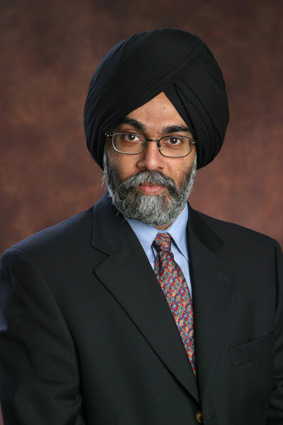 Professor Sing is an accomplished author as well as an excellent communicator. He is internationally renowned for his vast experience in the economics of Asia and the Pacific Rim, and is highly qualified in the area of business strategy.
Professor Sing is an accomplished author as well as an excellent communicator. He is internationally renowned for his vast experience in the economics of Asia and the Pacific Rim, and is highly qualified in the area of business strategy. 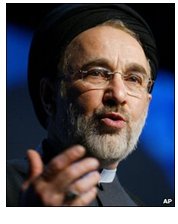 Mohammad Khatami is one of the most eminent world leaders of our time. President of Iran from 1997 to 2005, he was chosen by over 20 million Iranians, nearly 70 percent of the vote. He fought for civil rights, tolerance and freedom of expression and favoured a free market economy, foreign investments and established better relations with the West. Today, with his Foundation for Dialogue Among Civilisations, Khatami speaks on the urgent need for dialogue between religions, among countries and across generations.
Mohammad Khatami is one of the most eminent world leaders of our time. President of Iran from 1997 to 2005, he was chosen by over 20 million Iranians, nearly 70 percent of the vote. He fought for civil rights, tolerance and freedom of expression and favoured a free market economy, foreign investments and established better relations with the West. Today, with his Foundation for Dialogue Among Civilisations, Khatami speaks on the urgent need for dialogue between religions, among countries and across generations.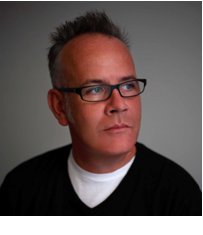 Mark Earls is one of the marketing world’s leading authorities on consumer behaviour and behaviour change. Mark has collaborated with large scale organisations like Ogilvy, The Account Planning Group and St. Luke Communications and while he has remained dedicated to finance, his distinctive take on human behaviour has brought about key marketing initiatives leading him to write the hugely influential and groundbreaking book ‘Herd: How to Change Mass Behaviour by Harnessing Our True Nature’.
Mark Earls is one of the marketing world’s leading authorities on consumer behaviour and behaviour change. Mark has collaborated with large scale organisations like Ogilvy, The Account Planning Group and St. Luke Communications and while he has remained dedicated to finance, his distinctive take on human behaviour has brought about key marketing initiatives leading him to write the hugely influential and groundbreaking book ‘Herd: How to Change Mass Behaviour by Harnessing Our True Nature’. Mira Nair is a highly acclaimed film director, writer and producer. From her debut film, the Oscar-nominated Salaam Bombay! to her Amelia Earhart biopic, Amelia, Mira Nair has established herself as one of the most formidable directors working today. Her latest film, The Reluctant Fundamentalist, is a striking commentary on identity, immigration, and terrorism. Away from the camera, Nair has mentored as part of the Rolex Protege Arts Initiative and her company, Mirabai films, established a non-profit, Maisha, in support of screenwriters and directors in East Africa and South Asia.
Mira Nair is a highly acclaimed film director, writer and producer. From her debut film, the Oscar-nominated Salaam Bombay! to her Amelia Earhart biopic, Amelia, Mira Nair has established herself as one of the most formidable directors working today. Her latest film, The Reluctant Fundamentalist, is a striking commentary on identity, immigration, and terrorism. Away from the camera, Nair has mentored as part of the Rolex Protege Arts Initiative and her company, Mirabai films, established a non-profit, Maisha, in support of screenwriters and directors in East Africa and South Asia. James Alexander is a highly practical business creator and innovative strategist. He is a co-founder and Board Director of Zopa, the marketplace where people meet to lend and borrow money, which launched in 2005, and until 2007 he was UK CEO. He is also currently a Trustee and CEO of Green Thing, a public service that inspires people to lead a greener life.
James Alexander is a highly practical business creator and innovative strategist. He is a co-founder and Board Director of Zopa, the marketplace where people meet to lend and borrow money, which launched in 2005, and until 2007 he was UK CEO. He is also currently a Trustee and CEO of Green Thing, a public service that inspires people to lead a greener life. Loïc Le Meur is a French serial entrepreneur based in San Francisco. He co-founded the highly popular European tech event LeWeb, a platform where new ideas, innovations and visions can be shared. Each year in Paris, LeWeb brings together 3500 web technology business leaders including entrepreneurs, users, developers, investors and journalists from 80 countries all ready to shape the future. LeWeb was also launched in London.
Loïc Le Meur is a French serial entrepreneur based in San Francisco. He co-founded the highly popular European tech event LeWeb, a platform where new ideas, innovations and visions can be shared. Each year in Paris, LeWeb brings together 3500 web technology business leaders including entrepreneurs, users, developers, investors and journalists from 80 countries all ready to shape the future. LeWeb was also launched in London. 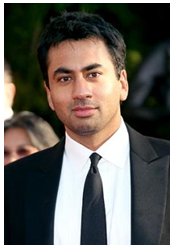 Kal Penn is a rising actor in Hollywood. He is known for his starring roles in House, 24 and, of course, the Harold and Kumar franchise. Penn has stopped his career midstream to work full time in politics. From 2009 to 2011, he was the Associate Director at the White House Office of Public Engagement, where he focused on work related to “don’t ask, don’t tell,” increasing financial aid and bringing Americans back from Iraq.
Kal Penn is a rising actor in Hollywood. He is known for his starring roles in House, 24 and, of course, the Harold and Kumar franchise. Penn has stopped his career midstream to work full time in politics. From 2009 to 2011, he was the Associate Director at the White House Office of Public Engagement, where he focused on work related to “don’t ask, don’t tell,” increasing financial aid and bringing Americans back from Iraq.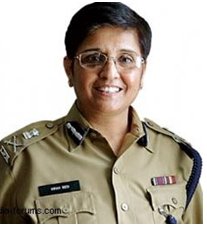 Dr Kiran Bedi is India’s first and highest female ranking officer who joined the Indian Police Service in 1972. Her expertise includes more than 35 years of creative and reformative policing and prison management. As the first and highest-ranking female officer in the national police force, she earned a reputation for being tough yet innovative on the job. Her latest initiative, Mission Safer India, aims to ensure that police log and address citizen complaints. She brought awareness of public rights to ground level through her reality T.V show: App Ki Kachehri Kiran kay Saath (Your court with Kiran).
Dr Kiran Bedi is India’s first and highest female ranking officer who joined the Indian Police Service in 1972. Her expertise includes more than 35 years of creative and reformative policing and prison management. As the first and highest-ranking female officer in the national police force, she earned a reputation for being tough yet innovative on the job. Her latest initiative, Mission Safer India, aims to ensure that police log and address citizen complaints. She brought awareness of public rights to ground level through her reality T.V show: App Ki Kachehri Kiran kay Saath (Your court with Kiran).  Mike Harris is the former Executive Chairman of Garlik which won the prestigious BT Flagship Award for innovation in 2008. Mike also mentors SME owners and entrepreneurs interested in developing and funding ideas and accelerating growth. Mike was also Chair of Innovation at Royal Bank of Scotland from 2005 until March 2009, where he supervised the establishment of a group wide innovation programme.
Mike Harris is the former Executive Chairman of Garlik which won the prestigious BT Flagship Award for innovation in 2008. Mike also mentors SME owners and entrepreneurs interested in developing and funding ideas and accelerating growth. Mike was also Chair of Innovation at Royal Bank of Scotland from 2005 until March 2009, where he supervised the establishment of a group wide innovation programme. George Kohlrieser is an internationally recognised expert on leadership, bestselling author, consultant and motivational speaker. He is Professor of Leadership and Organizational Behavior at one of the world’s leading business schools, the Institute of Management Development (IMD) in Switzerland. He specialises in conflict management, leadership, high performance teamwork, change management and professional development.
George Kohlrieser is an internationally recognised expert on leadership, bestselling author, consultant and motivational speaker. He is Professor of Leadership and Organizational Behavior at one of the world’s leading business schools, the Institute of Management Development (IMD) in Switzerland. He specialises in conflict management, leadership, high performance teamwork, change management and professional development. 